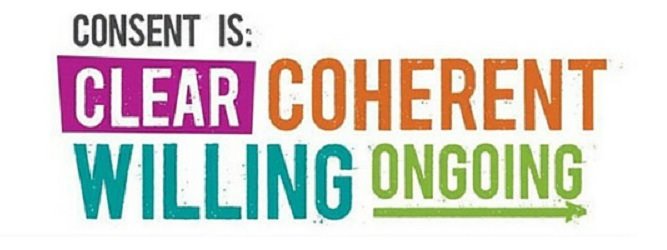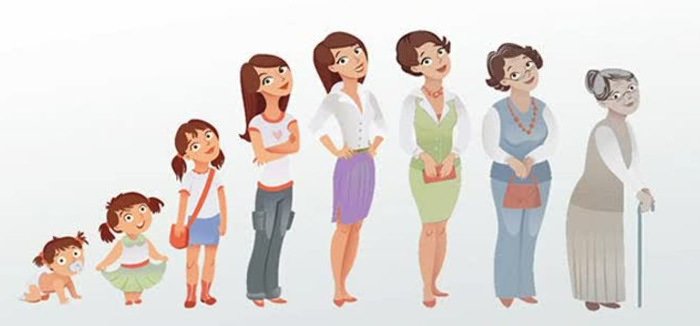This is the last in a series of articles regarding the concept of “age of consent.” The first two parts can be seen here:
https://steemit.com/voluntaryism/@larkenrose/age-of-consent-part-one
https://steemit.com/voluntaryism/@larkenrose/age-of-consent-part-two

As the father of a now grown daughter, I admit I was cautious and protective when she was younger, but that manifested itself more by monitoring and controlling the environment she grew up in, and keeping it safe, rather than by imposing “rules” and commands upon her. The goal was to always try to explain as soon as possible the reasons for what we did, including the choices we made for her when we didn’t give her a choice. We wanted her to be fully self-owning and self-guiding as soon as possible, but without putting her at serious risk.
However, when I hear people opining that they would only ever use logical persuasion on a child, rather than making some choices for them, that almost always tells me that that person has never been a parent. No, I’m not saying that people can’t have opinions on such things unless they’ve been a parent, but I am saying that if you’ve never experienced it, it’s a lot easier to engage in wishful thinking when it comes to imagining that your children will come into this world fully conscious, informed and wise, and therefore can be trusted, from day one, to make all of their decisions for themselves.
They can’t.

Some well-intentioned people will opine that if the child wants to eat nothing but candy, just let them; they will get sick, learn their lesson, and then suddenly choose a healthy diet. However, several generations of overweight, unhealthy children—even when the parents were trying to control their diets—show that that is not how it works. At the same time, if you control them with “rules” without ever explaining the reasons, then the moment they can get away with ignoring or breaking your “rules,” why wouldn’t they? If, for example, the only reason they don’t eat doughnuts all day is because you tell them they’re not allowed to, when the day comes when it’s their decision, what do you think they will do?
And that brings us back to the concept of sex. Human beings are a biological species, and when puberty hits, there is a very strong biological drive to reproduce. (Any species without that would very quickly die out.) Unfortunately, in human beings that drive usually hits full strength long before one’s mental capacity hits full strength. Nonetheless, there is a fundamental difference between two people who both physically want to have sex (even if their ignorance and irresponsibility make that a bad idea) and the predatory situations where some child doesn’t understand it or want it, but is enticed into it by an adult.

And that is an important concept, and a big factor in deciding where to “draw the line” when it comes to supposedly “consensual” sex with children: if someone is young enough that they have no sex drive, then they obviously don’t understand what it is, don’t desire it for any natural, biological reason, can’t fully understand the effects of doing it (or why anyone else would want to), and therefore would only do it if enticed or tricked into it by someone else.
And that concept actually matches an instinctive, “gut level” reaction that many of us naturally feel about the subject: while we may view it as inappropriate or even “gross” (not a very technical term) when, for example, a very young but post-pubescent girl wants to have a sexual relationship with someone significantly older, we see it as far more repulsive and heinous—and likely deserving of violent retribution—if an adult tries to seduce a child into sexual activity when the child doesn’t desire it at all, doesn’t want it, and doesn’t even know or understand what it is.
The former, even if we find it distasteful or disgusting, doesn’t automatically warrant forcible interference. The latter is, and should be, viewed and treated as predatory behavior, as the abuse of innocents, and it is morally justified to use whatever means necessary to deter or prevent such behavior.

And that brings up one of the most important distinctions when it comes to the concept of “age of consent,” which often doesn’t even get mentioned. And that distinction is this: there is a big difference between, “I don’t think that’s a good idea,” and, “I have the right to use force to stop that from happening.” Frankly, I personally think that a whole lot of sex that already occurs, even between consenting adults, is a bad idea for various reasons, whether they be health-related, emotional or psychological, having to do with getting pregnant, etc. But I certainly don’t claim the right to use coercion to prevent it from happening, just because I think it’s not a good choice.
So, for example, do I think it’s likely to be psychologically unhealthy, and will often end badly, when some fifteen-year-old girl is happily going out with some twenty-five-year-old dude? Yes. In fact, I think that’s pretty “messed up” (to use a somewhat less-than-scientific term). However, would I use violence to try to stop it, if they were both actually happy about it? No. (If it was my daughter, however, I would sure as hell try to talk her out of it.)
As an aside, the way politicians ignore this factor, while doing the routine of drawing arbitrary legislative lines, gives rise to insane situations such as some 18-year-old boy being convicted of “statutory rape” for having consensual, mutually-desired sex with his 15-year-old girlfriend, as if that is at all the same thing as genuine rape. This is yet another example of how people need to get out of the “there-ought-to-be-a-law” mindset. Just because you don’t like someone else’s decisions or preferences doesn’t all by itself justify forcibly interfering, on your own or by way of “government.”

The bottom line is that if there is actual consent, where those involved all the way know and understand what they are agreeing to and understand the consequences (which, when it comes to sex, is impossible in the case of small children), then however improper or unhealthy it may seem to you or me, forcibly interfering is not justified. It doesn't mean you have to like it, or approve of it. It means only that you should refrain from initiating violence.
Ironically, the very same belief in “authority” that makes some people run off to “government” to try to prevent the sexual abuse of children drastically increases the potential for such abuse. When children are continually bombarded and surrounded by the message that obedience is a virtue, and disobedience is a sin, and taught to obey “authority” figures even when they are complete strangers, it should come as no surprise that this gives a huge advantage to would-be abusers.
A particularly infuriating real-world example of this can be seen in the case of Louise Ogborn, who cooperated with prolonged sexual torment and assault at the hands of a complete stranger, at the behest of a voice on the phone claiming to be a police officer. There can hardly be a more clear-cut example of the dangers of the belief in “authority.” In an interview with 20/20, the victim explained how she had always been taught to obey grown-ups, so she passively complied with her own victimization.
So a final important concept to keep in mind with regard to the concept of “consent” is that most people, including most adults, have been programmed to feel so compelled to obey the instructions of a perceived “authority” that they can easily be persuaded to bow to the will of others, to appear to “consent” to things they don’t at all want, to the detriment of themselves and others. The experiments done by Dr. Stanley Milgram show this all too clearly. And this applies to children just as much as it applies to adults, if not more so.
When small children are taught to automatically trust and obey their “elders” by default, even “elders” who are complete strangers, that is a recipe for disaster. It would be far better if children were taught instead the idea of self-ownership as soon as possible, which includes their right to say “no” to anyone of any age who would violate their space, their property, and their bodies. Complacent and obedient victims are what predators always want, whether they are child molestors or politicians. Or both.

To put it another way, in an effort to keep your children safe from the parasites and predators of the world, teaching them the virtue of disobedience—teaching them to refuse to consent to all the would-be controllers and exploiters of the world—is one of the best things you can do for them.
(P.S. If you find value in the writings, videos, or other works of Larken Rose, or want to support the making of “The Mirror,” feel free to support his efforts by PayPal (to “[email protected]”) or Bitcoin (16q2CrisrzCZUA87QLq8Z8CSXTCcwzpWza), or through Patreon (https://www.patreon.com/user?u=347021).)

Excellent series, Larken. Just like when we were hanging at "your rock" at PorcFest, I really enjoy hearing more about your personal decisions as a father not because I need to follow someone, but because you have a lot of wisdom, and I enjoy learning from it. So many things are cleared up when we look at our biology such as puberty or brain developement. It's so sad how much "authority" bypasses reality to create arbitrary proxies with less than helpful correlation.
oh no im missed some parts ...sorry .
Good work!
Great article, and remember to buy Bitcoin folks.
Awesome post friend.
I like your all content because your content type and quality is so good.
best of luck go ahead friend.
nice post.
Congratulations, your post received one of the top 10 most powerful upvotes in the last 12 hours. You received an upvote from @thejohalfiles valued at 108.29 SBD, based on the pending payout at the time the data was extracted.
If you do not wish to receive these messages in future, reply with the word "stop".
click here.Congratulations @larkenrose, this post is the most rewarded post (based on pending payouts) in the last 12 hours written by a Superuser account holder (accounts that hold between 1 and 10 Mega Vests). The total number of posts by Superuser account holders during this period was 1128 and the total pending payments to posts in this category was $5917.37. To see the full list of highest paid posts across all accounts categories,
If you do not wish to receive these messages in future, please reply stop to this comment.
thank you, was a good read!
I agree with you, Larken. But at many schools there are the rule - the teacher is whright always. And kids are accustomed that adults are authority figures in all situations
Wth? I upvoted and your balance DROPPED by 4¢. That doesn’t make sense.
Coincidence. There are random fluctuations, and the value of Steem probably happened to drop a bit right when you voted.
Yeah, I think the balance should be shown in STEEM (or, also, to not remove information like Microsoft is infamous for doing...).
Nice information, I like this post :)
Nailed it, as always. You only used 3 tags.
I keep missing your posts until I see them on Facebook.
(NB: Yes I follow him, but I follow lots of people) Could you consider using #anarchy too, please.
Beautiful a concept I work here interested in, I do any work can?
Great stuff, great quality content! @originalworks
To call @OriginalWorks, simply reply to any post with @originalworks or !originalworks in your message!
A 15 year old lacks the ability to consent.
It depends.
Larkenrose? I remember that news story about Louise Ogborn. Once that criminal matter went to trial, a mental health professional on the side of the defense had the audacity to testify that Louise Ogborn's ordeal was a positive sexual learning experience. Some of these shrinks can be so outrageous in what they say on the witness stand.
Source 1
Source 2
Spamming comments is frowned upon by the community. Continued comment spamming may result in action from the cheetah bot.
More Information:
The Art of Commenting
Comment Classifications